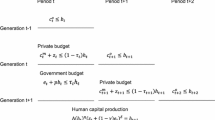Abstract
This paper introduces an overlapping-generations model with earnings heterogeneity and borrowing constraints. The labour income tax and the allocation of tax revenue between social security and forward intergenerational public goods are determined in a bidimensional majoritarian voting game played by successive generations. The political equilibrium is characterized by an ends-against-the-middle equilibrium where low-income and high-income individuals form a coalition in favour of a lower tax rate and less social security while middle-income individuals favour a higher tax rate and greater social security. Government spending then shifts from social security to public goods provision if higher wage inequality is associated with a borrowing constraint and a high elasticity of marginal utility of youth consumption.
Similar content being viewed by others
References
Arawatari, R. and T. Ono (2013) “The Political Economy of Social Security in A Borrowing-Constrained Economy”, Journal of Public Economic Theory, Vol. 15, pp. 448–476.
Bellettini, G. and C. Berti Ceroni (2007) “Income Distribution, Borrowing Constraints and Redistributive Policies”, European Economic Review, Vol. 51, pp. 625–645.
Benabou, R. (2000) “Unequal Societies: Income Distribution and the Social Contract”, American Economic Review, Vol. 90, pp. 96–129.
Bernasconi, M. and P. Profeta (2012) “Public Education and Redistribution When Talents Are Mismatched”, European Economic Review, Vol. 56, pp. 84–96.
Bethencourt, C. and V. Galasso (2008) “Political Complements in the Welfare State: Health Care and Social Security”, Journal of Public Economics, Vol. 92, pp. 609–632.
Boldrin, M. and A. Rustichini (2000) “Political Equilibria with Social Security”, Review of Economic Dynamics, Vol. 3, pp. 41–78.
Borck, P. (2007) “On the Choice of Public Pensions When Income and Life Expectancy Are Correlated”, Journal of Public Economic Theory, Vol. 9, pp. 711–725.
Casamatta, G., H. Cremer and P. Pestieau (2000) “The Political Economy of Social Security”, Scandinavian Journal of Economics, Vol. 102, pp. 503–522.
Chen, K. and Z. Song (2009) “Markovian Social Security in Unequal Societies”, [Cited 1 July 2013.] Available at SSRN: http://ssrn.com/abstract=1367476
Conde-Ruiz, J. I. and V. Galasso (2003) “Early Retirement”, Review of Economic Dynamics, Vol. 6, pp. 12–36.
——— and ——— (2005) “Positive Arithmetic of the Welfare State”, Journal of Public Economics, Vol. 89, pp. 933–955.
—— and P. Profeta (2007) “The Redistributive Design of Social Security Systems”, Economic Journal, Vol. 117, pp. 686–712.
Cooley, T. F. and J. Soares (1999) “A Positive Theory of Social Security Based on Reputation”, Journal of Political Economy, Vol. 107, pp. 135–160.
Cremer, H., P. De Donder, D. Maldonado and P. Pestieau (2007) “Voting Over Type and Generosity of A Pension System When Some Individuals Are Myopic”, Journal of Public Economics, Vol. 91, pp. 2041–2061.
Diamond, P. and J. A. Hausman (1984) “Individual Retirement and Savings Behavior”, Journal of Public Economics, Vol. 23, pp. 81–114.
Gottschalk, P. and T. M. Smeeding (1997) “Cross-National Comparisons of Earnings and Income Inequality”, Journal of Economic Literature, Vol. 35, pp. 633–687.
Ichino, A., L. Karabarbounis and E. Moretti (2011) “The Political Economy of Intergenerational Income Mobility”, Economic Inquiry, Vol. 49, pp. 47–69.
Leroux, M.-L., P. Pestieau and M. Racionero (2011) “Voting on Pensions: Sex and Marriage”, European Journal of Political Economy, Vol. 27, pp. 281–296.
Levy, G. (2005) “The Politics of Public Provision of Education”, Quarterly Journal of Economics, Vol. 120, pp. 1507–1534.
Meltzer, A. and S. Richard (1981) “A Rational Theory of the Size of Government”, Journal of Political Economy, Vol. 89, pp. 914–927.
OECD (2013) OECD Factbook 2013: Economic, Environmental and Social Statistics, Paris: OECD.
Rangel, A. (2003) “Forward and Backward Intergenerational Goods: Why Is Social Security Good for the Environment? “, American Economic Review, Vol. 93, pp. 813–834.
Roberts, K. W. S. (1977) “Voting Over Income Tax Schedules”, Journal of Public Economics, Vol. 8, pp. 329–340.
Rodriguez, F. (2004) “Inequality, Redistribution, and Rent-Seeking”, Economics and Politics, Vol. 16, pp. 287–320.
Romer, T. (1975) “Individual Welfare, Majority Voting, and the Properties of A Linear Income Tax”, Journal of Public Economics, Vol. 4, pp. 163–185.
Shepsle, K. A. (1979) “Institutional Arrangements and Equilibrium in Multidimensional Voting Models”, American Journal of Political Science, Vol. 23, pp. 27–59.
Author information
Authors and Affiliations
Additional information
The authors would like to thank Professor Kazuo Ogawa, the Editor of this journal and three anonymous referees for their valuable comments and suggestions. Financial support of the Nomura Foundation is gratefully acknowledged.




